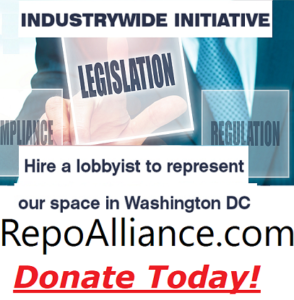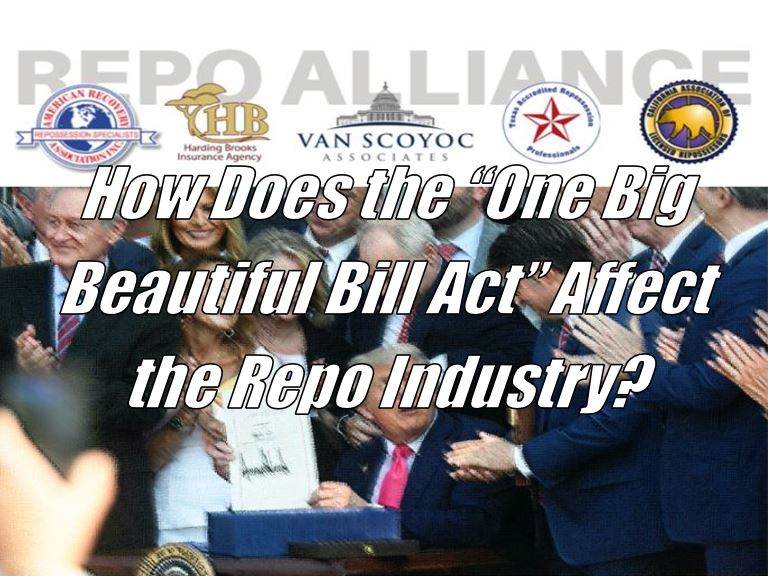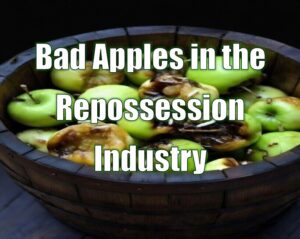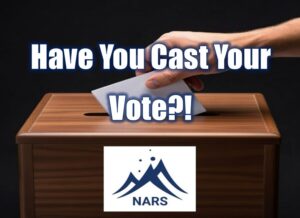Repo Alliance Update on the “One Big Beautiful Bill Act”
The ONE BIG BEAUTIFUL BILL ACT (OBBBA) has been passed what does it mean to us in the repossession community. It is uncertain how the following sections will effect the repossession community but we felt it was important to be sure you all are aware of them.
Section 70203: Allows for a deduction of the interest on auto loans for tax years 2025 thru 2028. This is only applicable to vehicles for which “ final assembly” is in the United States.
Section 70501: Repeals the tax credit for pre-owned electric vehicles purchased after September 30th 2025.
Section 70502: Repeals the tax credit for new electric vehicles purchased after September 30th 2025.
Section 30001: Reduces the CFPB (They are back) annual budget from 12% of the Federal Reserve Bank’s annual revenue to 6.5% of such revenue.
Although we don’t see any of these provisions as transforming any part of our industry, we felt it was important to point them out to you.
In addition to these auto specific provisions there are several business tax provisions that could be very helpful to our industry. BE SURE TO CHECK WITH YOUR TAX PROFFESSIONAL FOR GUIDANCE AND BENEFITS TO YOUR BUSINESS.
Section 199A: 20% Small Business Tax Deduction
Permanently extends the 20% Small Business Deduction
Allows pass-through entities to deduct up to 20% of their qualified business income
Without Congressional action, this provision would have expired at the end of the calendar year.
Permanency of the small business deduction allows small businesses to grow, hire, and invest in their workforce.
Estate Tax
Permanently enshrines the Estate Tax exemption and increases the exemption levels of $15 million individually and $30 million jointly, and is indexed for increases with inflation.
The estate tax is a tax on the transfer of an estate and or property upon the death of the owner.
By making this provision permanent, it allows small business owners to maintain their business and property without having to sell or liquidate to pay the tax.
Section 179
Increases Section 179 expensing cap from $1.25 million to $2.5 million and allows for increases with inflation.
Section 179 allows businesses to deduct the full purchase price of qualifying equipment in the year it is acquired.
The higher maximum deduction and permanency allow small business owners to significantly reduce taxable income and plan for future investments.
Form 1099-K
Increases the threshold requiring Form 1099-K from $600 to $20,000.
Section 1099-K is an IRS report that businesses must file for any third-party payment transactions above a certain threshold during the year.
The higher threshold minimizes burdensome IRS paperwork that small businesses must comply with while using third-party payments such as Venmo or PayPal.
Form 1099-NEC
This legislation increases the information-reporting threshold from $600 to $2,000 in a calendar year and indexed annually for inflation after 2026.
Form 1099-NEC is used by businesses to report payments made to non-employees, such as independent contractors, for services rendered during the calendar year. The higher threshold minimizes burdensome IRS paperwork for small businesses.
Form 1099-MISC
Increases the information-reporting threshold from $600 to $2,000 in a calendar year and indexed annually for inflation after 2026.
Form 1099-MISC is used to report various payments not classified as nonemployee compensation.
The higher threshold minimizes burdensome IRS paperwork for small businesses.
Section 168(k) (Bonus Depreciation)
Permanently restores 100% immediate expensing for eligible assets.
Section 168(k), bonus depreciation, allows businesses to take an additional first-year deduction for qualified property in the year it is placed in service.
Without Congressional action, businesses would have to amortize these expenses over a number of years.
The increased expensing threshold allows businesses to fully deduct property acquired and placed in service after January 2025.
Research and Development Expensing
Allows all research and development costs to be immediately deducted.
Allows taxpayers to immediately deduct domestic research or experimental expenditures paid or incurred in the tax years beginning after December 31, 2024.
Being able to deduct research and development costs immediately allows businesses to improve, upgrade, and innovate new products and services.
Section 163(j)
Reinstates the EBITDA (earnings before interest, income tax, depreciation, and amortization) limitation for the tax years beginning after December 31, 2024
Section 163(j) limits deductions on business interest expense
The reinstatement of EBITDA limitations allows small businesses to make use of more interest deduction.
C-Corp Rate
The C-Corp rate permanently remains at 21%.
SALT (State and Local Tax Deductions)
Increases the limit on the federal deduction for state and local taxes to $40,000 and adjusts for inflation. After 2029, this increase will expire.
This deduction begins to phase out at $500,000 of adjusted gross income. Once fully phased out, taxpayers revert to receiving a maximum of $10,000 in SALT deduction.
The SALT deduction allows taxpayers to deduct certain state and local taxes from their federal taxable income.
No Tax on Overtime
Creates a temporary deduction, for tax years 2025 through 2028, of up to $12,500 individually, and $25,000 jointly, for qualified overtime compensation received each year.
Having EYEs and Ears in Washington Keeps us off the Menu and at the Table.
WHO IS REPO ALLIANCE?
How and when was the group formed?
The initiative started several weeks ago with an invitation from ARA to all National and State Associations and other major industry leaders.
Is the Repo Alliance another association?
NO! The Repo Alliance is a collaborative effort of the groups which decided to answer the call and develop a fundraising program to further the interests of OUR industry and provide a voice at both National and State levels.
Which organizations came together?
American Recovery Association (ARA), the California Association of Licensed Repossessors (CALR), Texas Accredited Repossession Professionals (Texas ARP), and Harding Brooks Insurance.
How do you contribute?
A Square account has been established.
Click here to donate through Square.
Champion, Promote and Spread the word about this industry initiative!
Can I use any other method to contribute?
YES, you can mail a check, payable to Repo Alliance at 1400 Corporate Dr., Suite 175, Irving, TX, 75038.
Will funding reports and expenditures be available for review?
YES, this initiative will be completely transparent on monies raised with information available on the website.
One hundred percent of all monies raised will be used to pay for lobbying efforts. Everyone involved other than the lobbyist is a volunteer.
Why hire a dedicated lobbyist instead of just working with other lobbying groups?
We are working with other industry lobbyist groups but have realized without OUR OWN VOICE, we would be trusting the future of the Recovery Industry to the priorities of others. Riding the coattails of these other groups, puts our agenda as simply an afterthought.
What are the GOALS?
- Change the negative, reputational image of the Recovery Industry.
- Educate legislatures of the vital role we play.
- Fight against language in bills or guidance from agencies that would decimate the recovery industry.
Contact Us
info@RepoAlliance.com
833-737-6255
833-REPOALL












More Stories
Have You Cast Your Vote?!
Resolvion Announces Appointment of Ronald Eubanks as Executive Vice President of Client Strategy
TexasARP Is Looking for You!
American Recovery Service Partners with InsightLPR in Seismic Shift to Recovery Landscape
MBSi and VINchex Launch Automated Lien Verification Solution to Address Wrongful Repossessions
Big Agenda Updates at NARS 2026